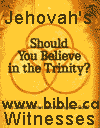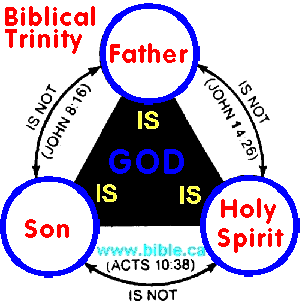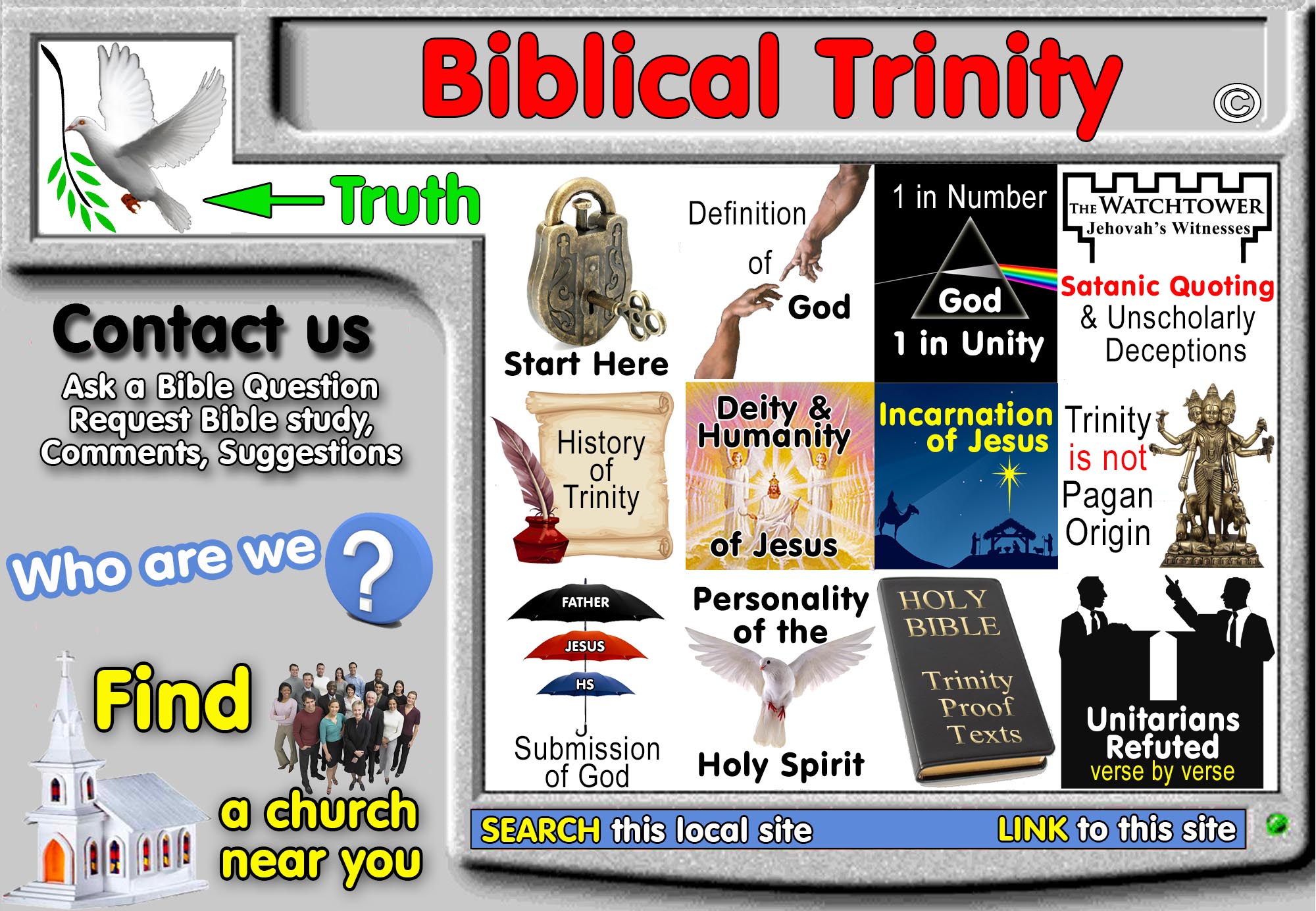|
|
|
|
Anti-Trinitarian rebuttal #2 |
Trinitarians cannot make sense of John 1:1 because how can Jesus be with the Father and be the same person as the Father? |
|
Anti-Trinitarian rebuttal #2 refuted |
Jehovah's Witnesses try to force the text to following modalistic rendering: "In the beginning was the Word, and the Word was with God the Father, and the Word was God the Father. He was in the beginning with God the Father." or using our own illustrative paraphrase, "In the beginning was EVE, and EVE was with ADAM, and EVE was ADAM. SHE was in the beginning with ADAM."
The solution is simple. We can even put an "a" in front of man, and it still refutes the JW's! Here is our own illustrative paraphrase of the NWT: "In the beginning was EVE, and EVE was with MAN, and EVE was a MAN. SHE was in the beginning with MAN."
As we have seen, they have replaced the word "God" which is in fact used in the sense of a class of being, with the "person of the Father" in the text. This is why their trap fails. We wonder if Jehovah's Witnesses even know that Modalists are anti-trinitarian, and that Trinitarians are not modalists. |
|
|
|
|
Anti-Trinitarian rebuttal #3 |
Trinitarians are forced to make the word "God" (theos) refer to two different things in John 1:1. This breaks the rule of consistent translation! |
|
Anti-Trinitarian rebuttal #3 refuted |
Jehovah's Witnesses do the exact same thing as some Trinitarians by breaking the rule of consistent translation! The first "God" reference they apply as a personal proper noun/name for the Father. The second "God" they apply not as a personal proper noun/name at all, but as a lessor class of being!
If Jehovah's Witnesses can render John 1:1 this way:
- "In the beginning was the Word, and the Word was with God (proper name of the Father), and the Word was God (
lesser class of being)."
Then we can render John 1:1 this way:
- "In the beginning was the Word, and the Word was with God (proper name of the Father), and the Word was God (
equal class of being)."
But in fact the only irrefutable Trinitarian position is ours when we render John 1:1 this way. Only we are consistent:
- "In the beginning was the Word, and the Word was with God (
equal class of being God), and the Word was God (equal class of being God)."
|
|
|
|
|
Anti-Trinitarian rebuttal #4 |
The NWT rendering of "a god" in John 1:1 clearly shows that Jesus is a creature. |
|
Anti-Trinitarian rebuttal #4 refuted |
Not true at all! What Jehovah's Witnesses haven't even yet comprehended is that their unscholarly addition of "a" doesn't make any difference! In fact, although wrong, we feel it is a waste of time proving it is unscholarly because it doesn't help them one bit!
Notice that there is absolutely no difference between:
"In the beginning was EVE, and EVE was with MAN, and EVE was MAN." (paraphrasing the NASB)
and
"In the beginning was EVE, and EVE was with MAN, and EVE was a MAN." (paraphrasing the NWT) |
|
|
|
|
Anti-Trinitarian rebuttal #5 |
My Bible does not capitalize "god" in John 1:1c. This proves Jesus is a creature. |
|
Anti-Trinitarian rebuttal #5 refuted |
There was no capitalization in the original Greek text. It was the translators of the NWT that, for theological reasons, chose not to capitalize "god". Herein lies an interesting opportunity for Trinitarians. We can grant for the sake of argument that "a god" is the proper rendering, but simply capitalize it to read, "a God". There is no acceptable reason that Jehovah's Witnesses can give to demand that God NOT be capitalized. We agree that Jesus is "a God". The Bible even says that that Father is also "a God". No argument here! (Ge 16:13; Dt 32:4; 1 Sa 2:3; 1 Sa 17:46; 1 Ch 17:24; Ne 9:17; Ps 5:4; Ps 7:11; Ps 68:20; Ps 86:15; Ps 89:7; Is 30:18; Is 45:15; Je 23:23; Je 51:56; Da 2:28; Mic 7:18; Luke 20:38; 1 Cor 14:33.) |
|
|
|
|
Anti-Trinitarian rebuttal #6 |
The word "God" in John 1:1c is a noun, therefore Trinitarians cannot view the word "God" as a verb, ie "deity". Trinitarians change the word "theos" (God) from a noun (person place or thing) into a verb (action or quality). To say, "and the Word was deity" violates the Greek. It is like saying, "and the Word was Holy/begotten" These are adjectives not nouns. The use of deity in the phrase "and the Word was deity" is an adjective, describing a quality of Jesus rather than a noun or a proper noun. |
|
Anti-Trinitarian rebuttal #6 refuted |
Such false arguments underscore a lack of the most basic understanding of grammar. The word "God" or "man" is always a noun. The word deity in Col 2:9 is a noun in the Greek: "in Him all the fulness of Deity [noun] dwells in bodily form". Deity describes not an action but a state of being God vs. man. These are all concepts within the function of a noun. The word "Theos" is used in John 1:1 to describe "God" as a class of being, just as "man" used in Gen 5:2 to describe is a class of being. |
|
|
|
|
Anti-Trinitarian rebuttal #7 |
"So we find that some translations of John 1:1 give the correct idea of the original language when they read: "The Word was with God, and the Word was divine," or was "a god," that is, the Word was a powerful godlike one. (An American Translation)" (Paradise, a Watchtower publication, p 39-40) |
|
Anti-Trinitarian rebuttal #7 refuted |
No recognized, major translation, will render John 1:1c "the Word was divine". (The Complete Bible: An American Translation, AmT, 1923-35 by E. J. Goodspeed, J. M. P. Smith, and 3 others.) The Moffatt translation does say, "the Word was divine", but it is a one man translation and Moffatt, although a trinitarian, was simply wrong. Neither Goodspeed or Moffatt would ever mean to convey that Jesus was a creature by their as both the Father and the Son are "divine", whereas angels are not.
So Jehovah's Witnesses point out that some well meaning Trinitarians however, will mistakenly translate John 1:1 "The Word was with God, and the Word was divine". This cannot be the case, however, for if John wanted to convey that Jesus had divine Godlike qualities, he would have used the adjective for "divine" [theios] as in Acts 17:29 and 2 Pe 1:3. Instead, John used the word for God, "theos".
But even if we grant, for the sake of argument, that God-like qualities are what John is intending to convey, we then translate the text (with consistency) this way: The Word was with deity, and the Word was deity." No problem here! (even though it doesn't properly reflect John 1:1) Every argument JW's use, falls to pieces under the slightest cross-examination! |
|
|
|
|
Anti-Trinitarian rebuttal #8
(Christadelphian) |
The phrase, "the Word was with God" does not mean the Son and the Father are distinct. "Word" (Gr. logos) simply means "something said" and refers to God's speaking in creation ("In the beginning" - cp. Gen 1:1,3). |
|
Anti-Trinitarian rebuttal #8 refuted |
Christadelphians are quite different from Arians (JW's) in that they deny Jesus had any personal pre-existence before his birth. The word "with" (Gr. pros) means "to, towards" when used with the accusative as it is here (Thayer, p.541). The word is generally translated "to" or "toward" (NKJV) or "unto" (KJV; see John 1:29,42,47; 2:3; 3:2,4,20,26). So this phrase cannot be referring to "something said" coming FROM God. |
|
|
|
|
Anti-Trinitarian rebuttal #9 |
John drew the phrase "In the beginning the Word was" from Genesis 1.1 [LXX, en arch]. It is clear the "beginning" has to do with the material preparation of earth for animal and human species. John's use of this phrase clearly connects Jesus with the creation as a creature of God. |
|
Anti-Trinitarian rebuttal #9 refuted |
It is interesting that Jehovah's Witnesses have no problem connecting John 1:1 with Gen 1:1 but kick and scream at the very suggestion that John 8:35 "I Am" is based upon Ex 3:14. We have no problem accepting that John's "beginning" is connected to the Genesis "beginning" given the parallels between the two accounts in reference to God, the beginning, creation, light, darkness and life. However to say that Jesus is a creature, because of this is completely unwarranted. After all JW's apply "the beginning" in Rev 21:5 and 22:13 to the Father. (even thought they in truth, apply to the Son.)
Would Jehovah's Witnesses deny that the Father was in the beginning? This argument is desperate and lacking. |
|
|
|
|
Anti-Trinitarian rebuttal #10 |
Acts 28:6 lacks the definite article just as in John 1:1c and is translated by virtually all translations as, " a god". ("But after they had waited a long time and had seen nothing unusual happen to him, they changed their minds and began to say that he was a god." Acts 28:6) This verse proves that the translation of John 1:1c for "theos" when the definite article is lacking, is "a god". The NWT is correct. |
|
Anti-Trinitarian rebuttal #10 refuted |
This argument is as desperate as it is wrong.
- The Father is called, "a God" in the NWT many times: Luke 20:38. Is Jehovah not "A GOD"? Yes, the Bible says so!
- "No justification whatsoever for translating THEOS EN HO LOGOS as 'the Word was a god.' There is no syntactical parallel to Acts 28:6 where there is a statement in indirect discourse; John 1:1 is direct....I am neither a Christian nor a Trinitarian." (Dr. J. Johnson of California State University, Long Beach)
- Any one who knows even the most basic elements of reading Greek text knows that Acts 28:6 cannot be used as proof that John 1:1c should be translated "a God". In both John 1:1 and Acts 28:6, "theon" is an anarthrous predicate noun. But the huge difference is that the verb "einai" follows "theon" in Acts 28:6.
- If we replace Paul in the story of Acts 28:6 with Jehovah it doesn't prove that Jehovah is a creature or "one of many" polytheistic gods. Imagine that Jehovah assumed a human form and got bit by a snake. The natives reply would not change one bit!
- What were the natives thinking when they said that Paul was a god? They would likely be thinking that Paul was one of MANY true gods. The natives would not think that Paul was a creature or a demi-god/angel made into man.
- Luke, in narrating Acts 28:6 deliberately leads the reader to understand that the natives believed Paul to be one of many polytheistic gods. John, in narrating John 1:1 is commenting, through inspiration, the nature of Christ as God. If Acts 28:6 is parallel to John 1:1, then EITHER John 1:1 teaches polytheism OR Acts 28:6 is referring to Jehovah. Of course, the passages are not parallel at all.
|
|
|
|
|
Anti-Trinitarian rebuttal #11 |
John 10:33 The Jews answered Him, "For a good work we do not stone You, but for blasphemy; and because You, being a man, make Yourself out to be God." "God" lacks the definite article as in John 1:1. Here the NWT renders it "a god" because the Jews obviously were accusing Jesus of being a polytheistic type of god typical of pagans. |
|
Anti-Trinitarian rebuttal #11 refuted |
- The real clincher is that the Jews were accusing Jesus of making himself out to be Jehovah, not some polytheistic demi-god. In fact every major translation, renders it, "make yourself out to be God". Only the NWT uses "a god".
- Any one who knows even the most basic elements of reading Greek text knows that John 10:33 cannot be used as proof that John 1:1c should be translated "a God". In John 10:33 "a god" [theon] is accusative case as the direct object of the verb "making", hence somewhat similar to an anarthrous predicate nominative with a form of the verb "to be". But again, like Acts 28:6, the noun "theon" follows the verb instead of preceding it as in John 1:1.
- Remember, many places refer to Jehovah as God where the definite article is lacking, just as in John 10:33
|
|
|
|
|
Anti-Trinitarian rebuttal #12 |
In Acts 12:22, "God" lacks the definite article as in John 1:1, and every translation renders it "a god". ("The voice of a god and not of a man!" Acts 12:22) |
|
Anti-Trinitarian rebuttal #12 refuted |
- This verse is clearly viewing Herod as a polytheistic god. Are Jehovah's Witnesses prepared to apply this to John 1:1? Of course not!
- The Greek is not parallel at all! The word "theos" in Acts 12:22 is anarthrous (lacks the definite article) but is in the genitive cases used to show possession, "gods". This means that it is not predicate nominative at all! The normal rendering for this verse would ALWAYS be "a god". And every translation renders it thus!
|
|
|
|
|
Anti-Trinitarian rebuttal #13

|
The Watchtower booklet, "Should You Believe In The Trinity" states:
"The Journal of Biblical Literature says that expressions " with an anarthrous [no article] predicate preceding the verb, are primarily qualitative in meaning." As the Journal notes, this indicates that the lo'gos can be likened to a god. It also says of John 1:1: "The qualitative force of the predicate is so prominent that the noun [the·os'] cannot be regarded as definite." So John 1:1 highlights the quality of the Word, that he was "divine," "godlike," "a god," but not Almighty God." |
|
Anti-Trinitarian rebuttal #13 refuted

"The Decepto-meter"
Satanic Quote |
- This is a satanic deliberate misrepresentation of what Philip B. Harner said in his article, "Qualitative Anarthrous Predicate Nouns: Mark 15:39 and John 1:1." in The Journal of Biblical Literature.
- Click here to see a full review of the satanic misquote by the Watchtower.
- Harner said in the same article: "the clause could be translated, 'the same nature as God.' This would be one way of representing John's thought, which is, as I understand it, that ho logos ["the word"], no less than ho theos ["the God"], had the nature of theos." (Philip B. Harner, "Qualitative Anarthrous Predicate Nouns: Mark 15:39 and John 1:1." in The Journal of Biblical Literature)
- Harner also flatly denies that John 1:1c could be translated "a god" or "divine" in the same article! Too bad the Watchtower wasn't honest enough to tell their blind followers this!
|
|
|
|
|
Anti-Trinitarian rebuttal #14

|
The Watchtower booklet, "Should You Believe In The Trinity" states:
" Jn 1:1 should rigorously be translated . . . 'the word was a divine being.'" (Dictionary of the Bible", by John L. McKenzie, 1965, p. 317, as quoted in, Should you believe the Trinity?, Watchtower publication) |
|
Anti-Trinitarian rebuttal #14 refuted

"The Decepto-meter"
Satanic Quote |
- It [The NT] offers no room for a statement of the relations of Father, Son, and Spirit
which would imply that one of them is more or less properly on the divine level of being than another. (Dictionary of the Bible, John L. McKenzie, Trinity, p899)
- That
McKenzie calls Jehovah a Divine Being!
 Click here to view full review of satanic quoting practices of the Watchtower. Click here to view full review of satanic quoting practices of the Watchtower.
|
|
|
|
|
Anti-Trinitarian rebuttal #15

|
William Barclay quoted by Watchtower
John is not here identifying the Word with God. To put it very simply, he does not say that Jesus was God' ." (Watchtower, May 15, 1977, page 320, quoting from Barclay's book, Many Witnesses, One Lord, 1963, pp. 23, 24). |
|
Anti-Trinitarian rebuttal #15 refuted

"The Decepto-meter"
Satanic Quote |
"The Watchtower article has, by judicious cutting, made me say the opposite of what I meant to say." (letter from William Barclay to Donald Shoemaker)
This is a satanic, deliberate misrepresentation of what William Barclay actually said. In this case Barclay actually wrote a letter after the Watchtower abused his materials. This is certain proof that the Watchtower is a deceiver when it quotes from sources! Usually the Watchtower misquotes those who have died and are not able to write such letters of protest.
 Click here to get the full story! Click here to get the full story!
|
|
|
|
|
Anti-Trinitarian rebuttal #16

|
Johannes Greber quoted in the JW's doctrinal encyclopedia, "Aid to Bible Understanding"
"A translation by the former Roman Catholic priest Johannes Greber (1937 ed.) renders the second appearance of the word "god" in the sentence as "a god."" (Aid to Bible Understanding 1971, p 1669) |
|
Anti-Trinitarian rebuttal #16 refuted

"The Decepto-meter"
Satanic Quote |
One of the most common references Jehovah's Witnesses once used to support "a god" in John 1:1. There is irrefutable proof that Greber was known to the Watchtower as an occult spiritist in 1953, but they did not stop using Greber until 1976. Then in 1983, the Watchtower deceptively claims "new light" and condemns Greber altogether, leading the blind followers to believe they only found out in the 1980's. Such deception of wickedness! In fact, the Watchtower felt that the doctrines the spirit revealed to Greber, were true. Remember, the Watchtower believes that the Holy Spirit communicates with the "governing body" in the production of the Watchtower magazine and the translation process of the NWT. Greber was making the identical claim that JW's make!
 Click here to get the full story! Click here to get the full story!
|
|
|
|
|
Anti-Trinitarian rebuttal #17

|
Earnest Haenchen is quoted in Watchtower:
"John 1:1, however, tells of something that was sin existence already in time primeval; astonishingly, it is not 'God'." (Ernst Haenchen, Das Johannesevangelium. Ein Kommentar, 1984, John 1. A Commentary on the Gospel of John Chapters 1-6, pages 108-10, translated by Robert W. Funk., as quoted by the Watchtower, December 15, 1985, p 25) |
|
Anti-Trinitarian rebuttal #17 refuted

"The Decepto-meter"
Satanic Quote |
The Watchtower commits every offence with Haenchen's work. They selectively quote to make Haenchen appear to say something opposite to what he is actually saying. They overlook the fact that Haenchen comes right out and says Jesus is not a creature. They again confuse modalism with trinitarian theology. They redefine Haenchen's words like "divine" in a way that Haenchen himself would object to. Finally, they rely on a sloppy translation by Funk, who takes some liberties, that Haenchen would not.
 Click here to get the full story! Click here to get the full story!
|
|
|
|
|
Anti-Trinitarian rebuttal #18 |
Since Jesus is called "a god" in John 1:1 of the NWT, that proves Jesus is a creature. |



